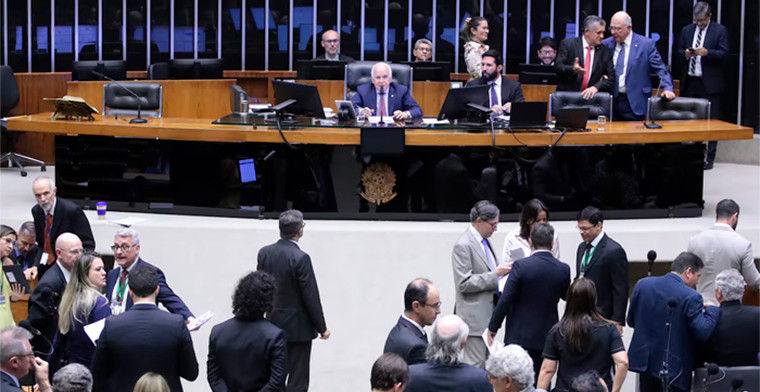Brasil: Lula's TV statement on restrictions on bets
Tuesday 01 de October 2024 / 12:00
2 minutos de lectura
(Brasilia).- At the beginning of the week, is expected that Lula will announce measures to restrict online bookmakers.

The betting epidemic has reached such a point that the Planalto is considering having Lula make the package public on national radio and TV.
The Ministry of Finance is working on the final adjustments to what will be announced - with the help of the Ministries of Health and Social Development on some topics.
There are plans to veto the use of credit cards and Bolsa Família cards to pay for bets; and also the obligation to display so-called responsible advertising in betting commercials (which includes not allowing, for example, advertising campaigns suggesting that the punter can become a millionaire with these bets).
Congress and parliamentarians are already working to legalise casinos and bingos
A group of deputies and senators won victories for betting during the regulations proposed by the Lula government. When contacted, politicians say that regulation prevents damage and allows tax collection.
There were 12 deputies and senators who defend the interests of gambling in Congress, forming a kind of ‘betting caucus’. The group is diverse and includes congressmen of all ideological persuasions. They range from Ciro Nogueira (PP- PI) to Rogério Carvalho (PT-SE).
Also, more than 300 betting companies handled between R$60 billion and R$100 billion in bets in Brazil last year, almost 1% of the Gross Domestic Product (GDP), according to projections by Strategy& Brasil, a strategic consultancy run by PwC. Of the total turnover, between R$40 billion and R$50 billion are not spent on goods and services (or invested in some application), says the consultancy's director, Mauro Toledo. In more drastic cases, spending on betting has led to players getting into debt.
Earlier this month, the Civil Police of Pernambuco launched Operation Integration to investigate the possible involvement of betting companies and exchange bureaus in money laundering. The investigations resulted in the pre-trial detention of digital influencer Deolane Bezerra, who has since been released, and the arrest, later revoked, of singer Nivaldo Batista Lima, known as Gusttavo Lima. Betting has also been criticised for driving low-income Brazilians into financial penury - a Central Bank report released this week showed that Bolsa Família beneficiaries spent R$3 billion on betting in August alone.
Betting caucus
Betting has been legal in Brazil since 2018, when the government of Michel Temer (MDB) sent a provisional measure on lotteries to Congress. The issue was supposed to be regulated within two years, i.e. during the government of Jair Bolsonaro (PL). But the retired army captain didn't do it - the regulation ended up being made last year, during Lula's administration. Minister Fernando Haddad (Finance) saw the issue as a possibility to increase government revenue.
The ‘betting caucus’ worked on the bill sent by Haddad to Congress. They secured several victories for the betting companies, such as an increase in deadlines and a reduction in taxes. It was also in the Chamber of Deputies that the bill began to allow so-called ‘online games’, a category that includes the ‘Tigrinho game’. The government's original bill only dealt with sports betting, not this type of ‘virtual casino’.
One of the main figures in the caucus, deputy Adolfo Viana (PSDB-BA), was the rapporteur for Haddad's bill in the Chamber. In his report, he guaranteed a reduction in the contribution of bets to Social Security, from the initial 10 per cent to just 2 per cent. ‘Today it's not a question of whether or not online gambling should be allowed in the country. It's about our responsibility to regulate this activity, which takes place all over the country,’ he said during the vote on the bill in the House last December.
Two ministries led by the Centrão, Tourism and Sports, benefited from the distribution of betting profits determined by Congress. Both will get 4 per cent of the total collected by the companies. Of the total collected, 82 per cent goes to the companies, and only 1.82 per cent goes to education.
Several senators tabled amendments to extend the term of the companies' concessions - the activity depends on authorisation from the Ministry of Finance. Soraya Thronicke (Podemos-MS), Nelsinho Trad (PSD-MS) and Rogério Carvalho (PT-SE) suggested increasing the validity of the licence from 3 to 5 years. Carvalho is one of the voices within the PT in favour of gaming, while other members of Lula's party turn up their noses at the activity. ‘This modality (casinos and bingos) can generate employment and mobilise sectors of the economy, so why can't it be regulated?’ he said when defending the legalisation of gambling during a session of the Senate's CCJ.
Appointed by his colleagues as one of the main defenders of betting, João Carlos Bacelar Batista, from the PV party in Bahia, proposed some amendments to benefit companies - such as the one that included video games (‘e-sports’) in the list of those on which bets could be placed. Luiz Philippe de Orleans e Bragança (PL-SP) tabled an amendment to allow betting companies to acquire the rights to broadcast sporting events (the same amendment was also tabled by Soraya Thronicke).
Bragança told Estadão in a statement that his amendment aimed to ‘promote sport and increase transparency in the sector’. ‘Adequate regulation is the most effective means of integrating the betting market, allowing for healthy competitiveness, and guaranteeing legal certainty and protection for consumers, especially the most vulnerable,’ he said. As president of the Parliamentary Front for the Free Market (FPLM), Bragança said he was against a ban on betting, as this would ‘push the sector into illegality, where there is no state control or guarantees for citizens’.
When the Lula government decided to regulate online betting, the task was left to the then assistant secretary for Prizes and Betting at the Ministry of Finance, Simone Aparecida Vicentin, and former special advisor Francisco Cimino Manssur. They were dismissed from their posts in May and February 2024, respectively, due to friction with members of the Centrão party. As Estadão showed, as soon as they left the government, the two went to head the ‘betting’ area of a law firm, which took part in the discussions on regulating gaming. Regis Dudena, who succeeded Vicentin, is currently in charge.
The offices of these civil servants were the destination of some of the members of the so-called ‘betting caucus’. One of the most frequent was Senator Rogério Carvalho. He has had at least three meetings with the Treasury to discuss the issue since the beginning of the government. In the most recent of these, held in September in Dudena's office, the parliamentarian was accompanied by businessman André Feldman, CEO of Big Brazil, who formalised a request to operate in the betting market in the Betting Management System (Sigap). Carvalho also had two meetings with the minister last year. Manssur attended both and Vicentin only the second.
Senators Ângelo Coronel (PSD-BA) and Irajá (PSD-TO) were received by Minister Fernando Haddad himself to discuss the issue, as was deputy Felipe Carreras (PSB-PE), who was the rapporteur for the project to legalise casinos in Brazil during the Bolsonaro government. Bacelar also met with Manssur last year to discuss the issue.
Ângelo Coronel reported the bets bill in the Senate's Economic Affairs Committee. In his text, he reduced the tax levied on companies compared to the rate approved in the House. He told the report that his report included ‘measures to prevent betting addiction and to prevent bettors from engaging in unhealthy or distorted behaviour, restrictions on the use of credit cards for betting, heavy inspection and licensing fees for these companies, anti-money laundering measures, as well as other limitations on advertising and the use of betting apps’.
On the rise
Economist Thomas Conti, from Insper, believes that the government's priority was simply to raise revenue from gambling, without analysing the possible social consequences of the decision more carefully. ‘In Brazil, there is no requirement to carry out a legislative impact analysis before passing a law, which leads to a series of decisions with poor reasoning,’ he says.
‘From an economic point of view, betting and mobile ‘casinos’ (such as ‘Tigrinho’) have many important differences, this segment of online casinos on mobile phones being much more addictive and with more economic research demonstrating the difficulties of overcoming the addiction they cause. No competent legislative impact analysis or regulatory impact analysis has been done for these changes in how these activities are regulated in Brazil,’ says Conti, who is a partner at AED Consulting, a consultancy firm.
The next bet: legalising casinos and bingos
With online betting already regularised, the next battle for the ‘betting caucus’ is to legalise land-based casinos, bingos and jogo do bicho in the country. On 8 August, the Senate held a session to discuss a bill to free these other forms of gambling.
For the president of the House, Rodrigo Pacheco (PSD-MG), legalisation means ‘bringing an economic activity that already takes place under state control’. He estimated that the market would generate ‘between R$14 billion and R$31 billion reais by 2023’. In June, Pacheco had already said that the issue had been ‘sufficiently discussed’ in the Senate, and that all that remains now is to ‘find the date to put it on the agenda of the full Senate’.
The bill that Pacheco wants to put to the vote was presented in 1991 by former deputy Renato Vianna, of the Santa Catarina PMDB. Last discussed in 2016, the bill came back to life in 2022, under the rapporteur Felipe Carreras, from the PSB in Pernambuco. According to Carreras, the release of casinos will prevent the clandestine operation of betting platforms and encourage tourism in Brazil. ‘In countries where gambling is legalised, we see a direct positive impact on tourism, generating jobs and boosting various sectors, such as hotels, modern convention centres, restaurants and entertainment,’ he said.
Senator Irajá, who is the son of former Agriculture Minister Kátia Abreu, is the current rapporteur for the bill to free casinos in the Senate. ‘If we compare with the G20, which are the countries of the world's 20 largest economies, in which Brazil is the eighth largest economy today, only Indonesia and Brazil have not yet legalised gambling and betting,’ Irajá told Agência Senado in August this year.
Another proposal to legalise casinos in Brazil is the one put forward by Bolsonaro's former Minister of the Civil House, Ciro Nogueira (PP-PI). In the past administration, Nogueira was part of the wing that defended the legalisation of gambling within the government. ‘Today Brazil is one of the countries with the most bets in the world. All of it illegal. Society, which could be receiving the fruits of the good side of gambling, the taxes, doesn't,’ said Nogueira.
In the first attempt to vote on Renato Vianna's bill, back in 2016, the special committee that analysed the proposal was chaired by deputy Elmar Nascimento (União-BA) - today, he is one of the main candidates for the Presidency of the House. ‘It's not really about defending (gambling). We need to regulate what already exists. We have very old legislation, which treats gambling as a misdemeanour, and this, because of everything that gambling involves, especially the large sums of money it generates, ends up encouraging people to act illegally,’ he said at the time. As leader of the União Brasil parliamentary bloc, Elmar also voted in favour of regulating betting at the end of last year.
Categoría:Legislation
Tags: Sin tags
País: Brazil
Región: South America
Event
ICE Barcelona 2026
19 de January 2026
Luz Beatriz Jaramillo Serna of 21Viral: “Our presence at ICE Barcelona 2026 was exceptionally positive”
(Barcelona, SoloAzar Exclusive).- Following her participation at ICE Barcelona 2026, Luz Beatriz Jaramillo Serna, Head of Business Development, Marketing and Sales for Latin America at 21Viral, analyzes the commercial impact of the event, the trends set to shape the industry’s direction, and the company’s strategic priorities to consolidate growth across the region and new regulated markets.
Monday 16 Feb 2026 / 12:00
Toni Karapetrov from Habanero on ICE Barcelona 2026: Regulated Growth, Localization and Strategic Expansion Drive 2026 iGaming Strategy
(Barcelona, Exclusive SoloAzar).- In this interview, Toni Karapetrov, Head of Corporate Communications at Habanero, shares insights from ICE Barcelona 2026, highlighting premium content innovation, high-level industry engagement, key iGaming trends such as localization and gamification, and the company’s strategic focus on regulated market expansion and sustainable growth in 2026.
Friday 13 Feb 2026 / 12:00
Martin Ivanov, COO of CT Interactive: “We plan to consolidate our presence in regulated markets across Europe and LATAM while actively expanding into Africa"
(Barcelona, SoloAzar Exclusive).- In this interview with SoloAzar following ICE Barcelona 2026, Martin Ivanov shares key insights on CT Interactive’s commercial achievements, emerging industry trends, expansion across Africa and regulated markets, and the company’s strategic priorities for 2026.
Monday 16 Feb 2026 / 12:00
SUSCRIBIRSE
Para suscribirse a nuestro newsletter, complete sus datos
Reciba todo el contenido más reciente en su correo electrónico varias veces al mes.



















